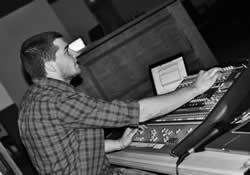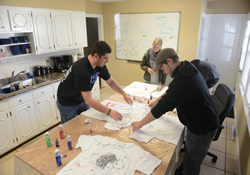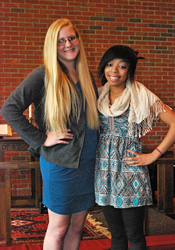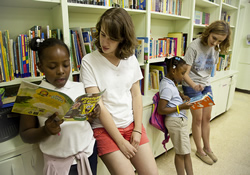Students find more to love at decidedly United Methodist-affiliated universities and colleges

Jordan Romines runs the soundboard during a concert by a worship outreach team from Southwestern College in Winfield, Kan.
COURTESY SOUTHWESTERN COLLEGE
Freshman Jordan Romines chose Southwestern College in Winfield, Kan., for both its small size and its United Methodist ties.
"I found the fact that it was a (United) Methodist college particularly enticing because I go to a Methodist church in my hometown," said Romines. "That's not something I saw when I was looking at other schools."
Since moving from his home in Sabetha, Kan., and enrolling at Southwestern in Fall 2012, Romines has found himself part of tight-knit community. He is a Discipleship scholar who serves the community, is part of a Disciple Bible study and covenant group, and will take on leadership roles. He leads a men's Friday night fellowship gathering that has become an important part of his student life.
Relationships permeate campus life
Enrollment at United Methodist-related higher education institutions in the United States ranges from 200 to 32,000 students. The 119 institutions include a medical school, historically black colleges and universities, women's colleges, two-year colleges, research institutions and more. All are fully accredited. Many feature prominently among the U.S. News & World Report, Washington Monthly, The Princeton Review and other rankings.
The United Methodist affiliation adds spiritual depth as it translates into strong faith communities, unique opportunities and a supportive learning environment throughout the school.
"People sometimes assume that the church-college relationship is exclusively about what happens in a school's campus ministry," said Melanie Overton, assistant general secretary for schools, colleges and universities at the General Board of Higher Education and Ministry in Nashville, Tenn.
While "the collegiate ministries are absolutely critical," she said, "the effect of participating in a United Methodist-related school is profound precisely because it's woven into the academic and social fabric of the community."
Outward signs, inward devotion
On campuses across the United States, visual symbols cue students and visitors to Christian associations.

Bonner Scholars at Lindsey Wilson College decorated T-shirts for survivors of child abuse to wear as examination gowns during their 2013 "Day of Service" on Martin Luther King Jr.'s birthday.
(c) LINDSEY WILSON COLLEGE
Walk onto the campus of Lindsey Wilson College in Columbia, Ky., and the nine-story, round chapel—with a lighted dome come dusk—draws the eye. The domed Hendrix Chapel at Syracuse University in New York stands out as one of most prominent connections to the institution's Christian roots. At Louisburg College in North Carolina, a labyrinth built by Professor Will Hinton represents life paths. "Sometimes in our life, we're able to choose the path that we walk on, and other times, we find ourselves confronted with journeys and paths which are not of our making," Hinton explained in a YouTube video.
Though these visible structures are outward signs, it is the inward life—the faith communities, spiritual guidance and encouragement and worldview—that sets United Methodist-affiliated institutions apart.
"While we're respectful of all religions, we are unashamedly a part of something much larger than us, which is Christianity," explained the Rev. Terry Swan, professor of religion and dean of the chapel at Lindsey Wilson. The mission statement includes the school's wish to expose the students to the love of God and Christ Jesus.
That goal shines through in how staff and faculty treat students. "That has a lot to do with how the young adults succeed, with the love, attention and caring," Swan said. "We really believe that we're putting wings under the arms of young people and encouraging them—and our Christianity causes us to do this." Swan believes the "intentionality of the church relationship" has contributed to Lindsey Wilson College's growth from some 400 students in the late 1970s to about 2,700 in 2012-13.
Syracuse offers "a United Methodist presence in dialog with people of other faith traditions—Christian and non-Christian," said the Rev. Thomas Wolfe, senior vice president and dean of student affairs. Wolfe called the school "a home for all faiths and a place for all people." He said the university believes that this dedication to inclusivity is important to United Methodist principles.
Enriching student experiences
An October 2012 video contest, sponsored by the National Association of Schools and Colleges of The United Methodist Church, asked college students how United Methodist connections enriched their experiences.
"These 36 student videos painted a portrait of educational communities that honor your faith journey as an integral part of your development," said Overton, one of the contest judges.
She called the United Methodist approach unique. Some secular campuses are simply unfriendly to religion, she said, while other church-related college communities narrowly prescribe what students should believe.
"What we heard over and over was that United Methodist-related schools offer young adults a place where they are neither pushed to rebel against their faith nor to isolate it from their intellectual development," Overton said. Students talked about opportunities to wrestle spiritually and intellectually with their faith and the steady support from peers and faculty.

Louisburg College students Ashley Britton (left) and Riana Bowling co-produced the winning video in a contest sponsored by the General Board of Higher Education and Ministry in Fall 2012.
COURTESY LOUISBURG COLLEGE
Louisburg student roommates Ashley Britton and Rianna Bowling co-produced the winning video. It demonstrates theological depth and understanding of students' developmental journeys, as well as how these journeys were different because Louisburg is connected to the church, Overton explained.
Syracuse students' experience includes being part of dialogue groups organized around gender, race, sexual orientation and religion. Participants earn credits as the "groups with different life experiences come together and they learn ... not just how to get along but (also) how to talk about their differences in a way that leads to constructive relationships," Wolfe said. "A student who comes to Syracuse University can count on having the opportunity to live more fully in a diverse context."
At Cornell College in Mount Vernon, Iowa, the United Methodist roots help guide a sense of global compassion and concern. "We hope that when they leave college they will be engaged community members wherever they go," said Cindy Strong, a chemistry professor who is active in a local United Methodist congregation. She helps coordinate the campus CROP Walk and Fair Trade Gift Market. "Our hope is that they have a sense of responsibility and opportunity to practice ... a lifetime involvement [in service]."
Laying groundwork
Many schools incorporate United Methodist principles into how and what students learn. Recognizing the importance of ethics and social service, Syracuse frames curriculum and co-curricular experiences as scholarship in action. For example, Wolfe said, the university partners with its home city.
"We bring the intellectual capital of the institution into real-life sustainable relationships with the City of Syracuse to bring about change that adheres to improving the nature of the community and the lives of the people in it," he said. The partnership has helped revitalize the city's Near West Side neighborhood community, which was devastated by hard economic times.
"But [we are] not just doing it because it's a good thing to do, but (also) because it's part of our educational mission," Wolfe explained. Student projects include green housing plans and examining social dynamics of a city in transition. A pathway tracing existing streets from the university to the heart of the city connects the two in a more tangible way—and sends the message that the university is for everyone, supporting the inclusion mission of the chapel and the university.
Lindsey Wilson invests in opportunities for every student that range from small groups to worship services and mission trips to inner-city communities or countries, such as Haiti and Mexico. Annually, school administrators surprise students by calling off classes for one day to allow students to do service projects across the community.
"When you see institutions put their resources towards [spiritual development and opportunities] then you know they're serious," said Swan. He sees student involvement in service projects and mission trips reflected in their career choices. Lindsey Wilson's three largest majors are all service occupations: human services (close to social work), Christian ministry and education.

Millsaps College interns Michala Sullivan (left) and Elizabeth Doyle (right) working with students from Brown Elementary School during their visit to the Children's Museum in Jackson, Miss. The young women participate in Millsaps' Faith and Work Initiative.
COURTESY ANN PHELPS
When students are exposed to people living in poverty, Swan said, seeds are planted that help direct their lives.
For United Methodist-affiliated institutions across the country, the commitment to a rich student experience is vital. The contest videos demonstrated students believe that their schools' commitments had made a difference, Overton said.
"Our students said over and over that they were receiving support in their faith journey [not only] from dedicated campus ministers but also from faculty and peers, and we know in the higher education community that faculty and peers are statistically the most influential individuals in college students' lives."
Carrie Madren is a freelance writer based in Great Falls, Va. She is a graduate of United Methodist-related Ohio Wesleyan University, where spring break mission trips, Bible Studies and the United Methodist Student Movement enriched all four years of college.
